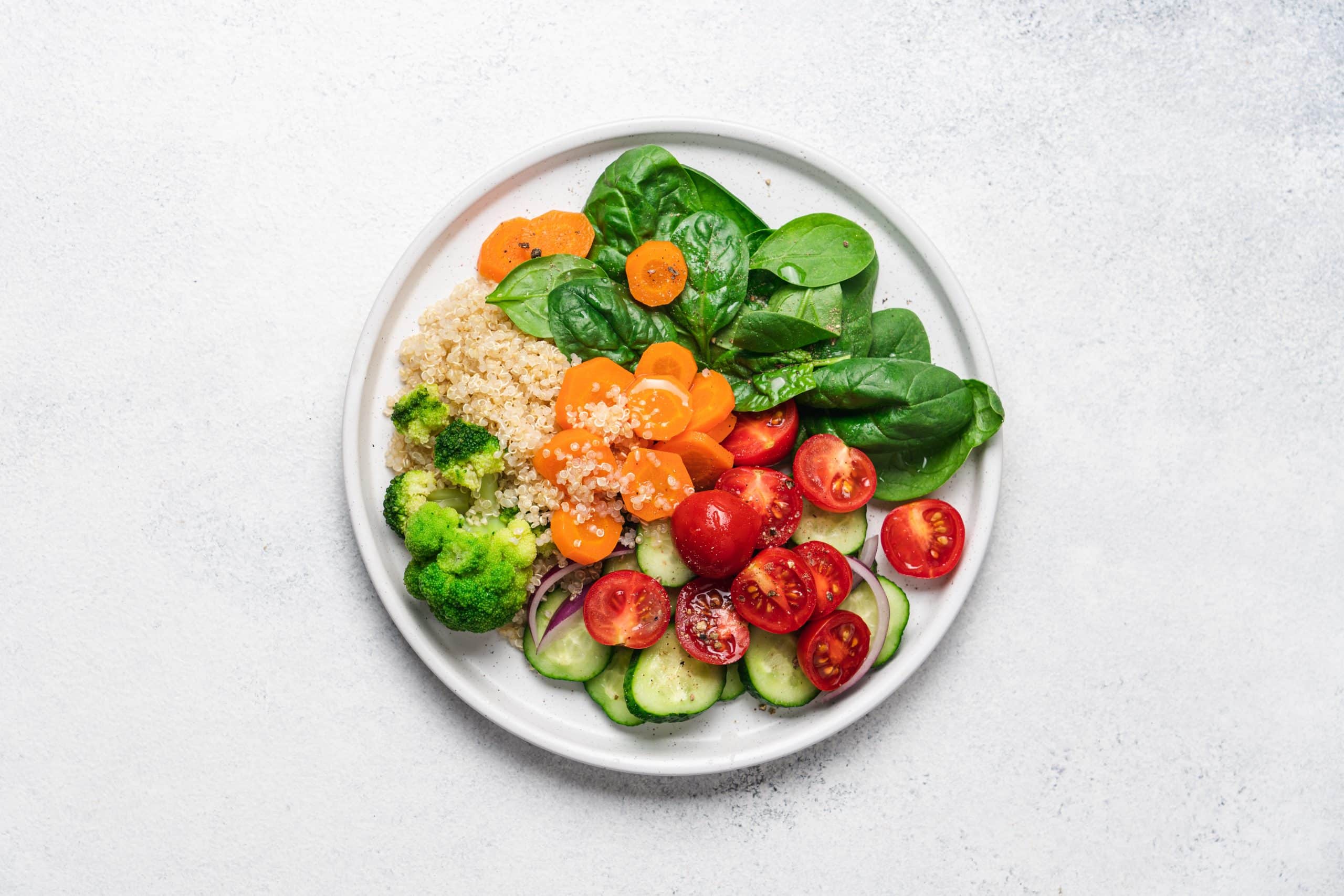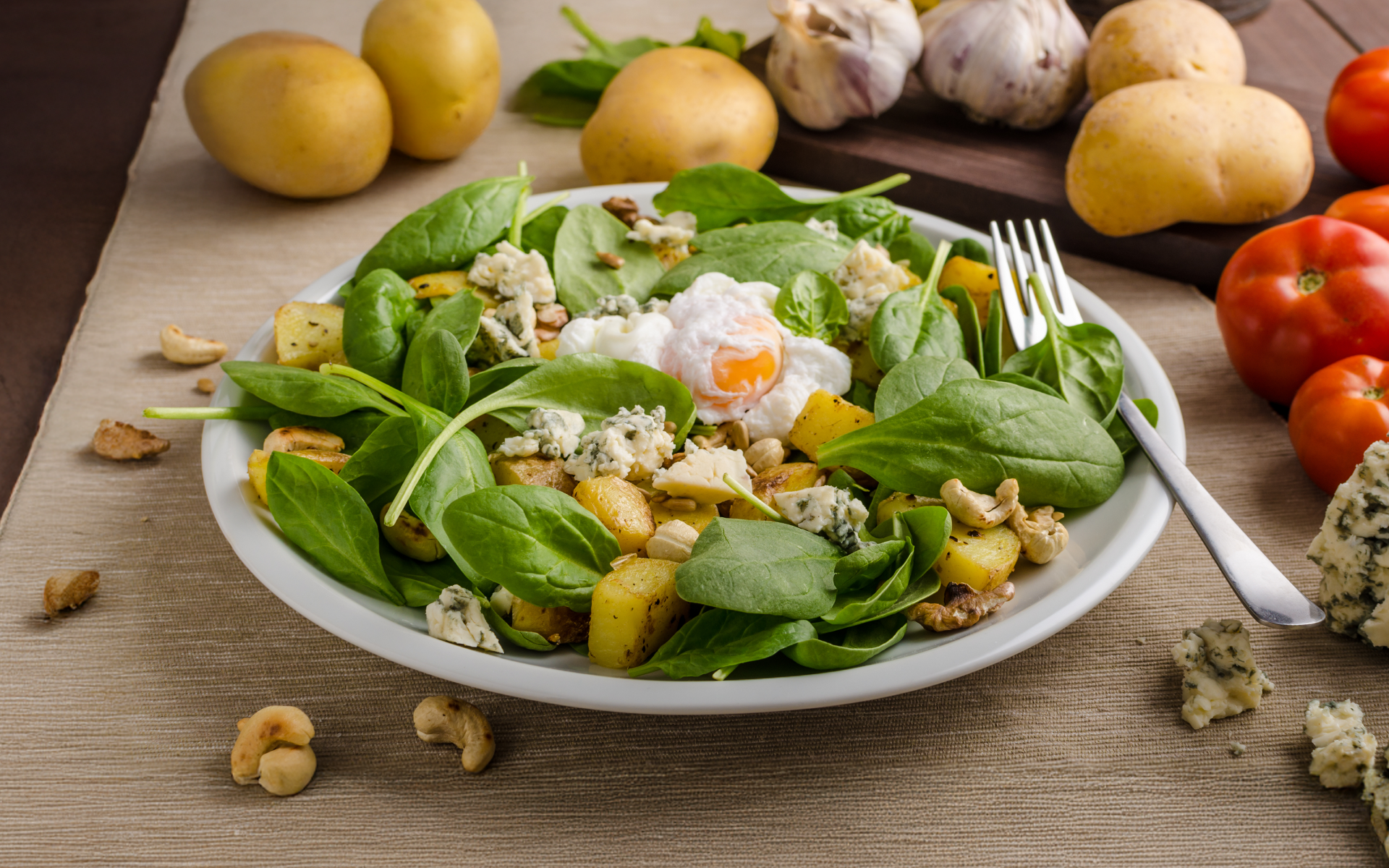What every type of vegetarian diet has in common is the avoidance of meat and sometimes other animal products. To meet their dietary needs, vegetarians rely on plant-based sources of protein such as legumes, nuts, seeds, and tofu.
Unfortunately, some may find it challenging to achieve weight loss or manage blood sugar levels due to the high carbohydrate content of some plant-based foods.
So a keto vegetarian diet, which limits carbs to encourage the body to burn fat for fuel, may be an effective solution for those who find low-carb diets to work best for them. It allows them to enjoy the benefits of vegetarianism while also achieving their weight and health goals.
Here’s what you need to know about combining a ketogenic diet with vegetarianism.
Is It Possible for a Vegetarian to Do Keto?
It’s possible for vegetarians to follow a keto diet, but it may require some careful planning and consideration. The traditional approach to keto involves consuming high amounts of animal-based foods such as meat, eggs, and dairy products that are rich in protein and fat while limiting carb intake.
However, plant-based proteins often come with higher carbohydrate content, which makes it more challenging to achieve the desired macronutrient ratios for a keto diet.
This is why vegetarian keto dieters must be mindful of their food choices and make sure they’re still getting enough protein and healthy fats while keeping their carb intake low.
How Do Vegetarians Get Protein on Keto?
Vegetarians can get protein on keto through nutrient-dense, plant-based sources. Some vegetables also contain a small amount of protein, so incorporating more of these into meals can help them meet their needs.
Vegetarian-friendly keto protein sources include:
Eggs (14 Grams Protein, 1 Gram Carbs in Two Large Eggs)
Eggs are a great source of complete protein and contain essential nutrients such as choline, vitamin D, and omega-3 fatty acids (12). They’re also incredibly versatile and can be incorporated into meals in various ways, such as scrambled, boiled, or as an omelet.
Eggs yolks contain cholesterol and it was previously believed that this could lead to an increase in blood cholesterol levels, potentially heightening the risk of heart disease. However, more recent studies have improved our understanding of the relationship between egg consumption and heart health (12).
Research summarized by Harvard Health suggests that consuming eggs in moderation may not have the dire impact on heart health that was once believed (3). Other dietary factors, such as saturated and trans fats, may play a more significant role in increasing heart disease risk.
Therefore, vegetarians on keto should consider their broader diet. What are you eating with your eggs? Are you frying them in butter or eating them alongside cheese, bacon, or sausage?
All these factors can contribute to an unhealthy diet and increased heart disease risk more than the egg itself. So, incorporating eggs into a keto vegetarian diet in moderation shouldn’t be a cause for concern. Moderation is usually defined as up to 1 egg per day.
If you struggle to even flirt with the idea of giving up your favorite foods or working out till your legs give way – BetterMe app is here to breathe a fresh perspective into the way you view the weight loss process! Check out the app and experience the fun side of fitness and dieting with BetterMe!
Greek Yogurt (15 Grams Protein, 4 Grams Carbs per 6 Ounces)
Greek yogurt is a protein-rich, probiotic-boosting option for vegetarians on keto. It’s an excellent source of calcium, potassium, and vitamin B12. The probiotics in Greek yogurt may be beneficial for digestive health and can even help with weight loss (9).
Be sure to choose plain, unsweetened Greek yogurt as flavored varieties can be loaded with added sugars and carbs. You can also opt for full-fat versions instead of low-fat or non-fat options in order to boost your fat intake.
For some types of vegetarians (such as vegans), Greek yogurt may not be an option due to its dairy content. In this case, other plant-based alternatives can be considered.
Hemp Seeds (9 Grams of Protein, 1 Gram Net Carbs per Ounce)
Hemp seeds are an excellent source of complete protein for vegetarians on keto. Unlike most other plant-based proteins, they contain all essential amino acids. They are also rich in healthy fats, including omega-3s and omega-6s, and contain fiber, iron, magnesium, and zinc (7).
Hemp seeds can be added to meals by sprinkling them on salads or adding them to smoothies. They can also be used as a topping for keto-friendly bread or crackers.
Other seeds, such as pumpkin, chia, and flax, also offer plant-based protein options for vegetarians on keto. However, they may have slightly higher net carb counts than hemp seeds, so you should be mindful of portion sizes.
The same applies to nuts, which are also an excellent source of protein for vegetarians on keto. However, some nuts such as cashews and pistachios contain more carbs than others such as almonds and walnuts.
Nut butters may also be incorporated into meals for added protein, but make sure you choose natural varieties without added sugars.
Tofu (24 Grams Protein, 3 Grams Net Carbs per Ounce)
Tofu is a staple for many vegetarians and can also be incorporated into a keto diet. It’s made from soybeans and is an excellent source of protein, iron, calcium, and other essential nutrients (5).
Tofu can be used as a meat substitute in dishes such as stir-fries, curries, and burgers. When purchasing tofu, you should opt for an organic, non-GMO variety to ensure it’s a healthier and more sustainable option (2).
There are some concerns about soy and its potential weak estrogen-like activity, but more research is required in this area. While animal and test-tube studies have shown mixed results, observational studies in humans have not identified a significant link between soy consumption and hormone-related cancers (2).
People with hypothyroidism may also want to limit their intake of soy-based products and consult a doctor, especially while they’re on medication.
Other soy-based sources of protein vegetarians may consider while on keto include:
Edamame (19 grams protein, 6 grams net carbs per 5.5 ounces) – These are young, green soybeans that can be enjoyed as a snack or added to salads and stir-fries.
Tempeh – (18 grams protein, 7 grams net carbs per 3.5 ounces) – This is a fermented soy product with a nutty flavor and firm texture. It can be used instead of meat in various dishes.
Natto – (18 grams protein, 14 grams net carbs per 3.5 ounces) – This is another fermented soy product that is commonly eaten in Japan. It has a slimy texture and strong flavor, but it can be incorporated into meals for added protein.
Read more: Is Pho Keto? The Ultimate Guide to Enjoying Pho on a Low-Carb Diet
Cottage Cheese (20 Grams Protein, 6 Grams Carbs per 6 Ounces)
Cottage cheese is the highest-protein, lowest-carb dairy option and can be a great addition to a vegetarian keto diet. It’s particularly rich in casein, a slow-digesting protein that can help keep you full and satisfied for longer (1).
As with Greek yogurt, make sure to choose plain, unsweetened cottage cheese and opt for full-fat versions instead of low-fat or nonfat options. It can be eaten as a snack or a dip or added to meals such as omelets or keto-friendly pancakes.
Other cheeses that may be suitable for vegetarians on keto include:
Parmesan cheese (9 grams protein, 1 gram carbs per ounce) – This is a hard, aged cheese that can add flavor and crunch to keto dishes.
Romano cheese (9 grams protein, 1 gram carbs per ounce) – This is another hard, aged cheese that can be used in the same way as parmesan.
Cheddar, Gouda, Swiss, Provolone, and other hard or semi-hard cheeses (7 grams protein, 1 gram carb per ounce) – These hard or semi-hard cheeses are all low in carbs and can be enjoyed as snacks or added to meals for extra flavor and protein.
Brie, Camembert, Feta, Mozzarella, and other soft or fresh cheeses (6 grams protein, 1 gram carb per ounce) – These types of cheese can add a creamy texture to dishes and are an excellent option for those on vegetarian keto.
Can a Vegan Do Keto?
A vegan can do keto, but it may be more challenging for them to follow due to the strict dietary restrictions of veganism and keto. Veganism involves avoiding all animal products, including meat, fish, dairy, eggs, and even honey.
As previously mentioned, many of the protein sources on a vegetarian keto diet come from animal-based products such as eggs and dairy. Therefore, vegans who are following a keto diet will need to rely heavily on plant-based proteins and fats.
Of course, there are many high-protein, low-carb plant-based options available, such as tofu and hemp seeds, but it may require more planning and creativity to ensure your nutritional needs are met.
A 7-day vegetarian keto meal plan may be fairly challenging to come up with, but a vegan keto meal plan will require even more effort and research to ensure all essential nutrients are being obtained from plant-based sources.
Pros of Going Keto as a Vegetarian
The keto vegetarian diet may offer the following advantages that the standard vegetarian diet may not:
Better Blood Sugar Control
By cutting out high-carb foods such as grains, fruits, and starchy vegetables, the keto diet can help improve blood sugar control (4). This can be beneficial for people with type 2 diabetes or other blood sugar disorders, particularly under the guidance of a healthcare professional. If you’re taking medication that lowers your blood sugar, you should speak to your doctor before going keto or making any other major dietary changes.
Potential Weight Loss
Both vegetarian and keto diets tend to reduce overall calorie intake when switching from a typical Western diet, which can result in weight loss. By following a vegetarian keto diet, individuals may experience better satiety and reduced cravings due to the high fat content while still being able to lose weight (8).
Lower Inflammation
Reducing refined carb intake, increasing healthy fats, and losing weight on a vegetarian keto diet may help reduce inflammation in the body (10). Chronic inflammation has been linked to various health conditions, including heart disease and type 2 diabetes.
Increased Energy
Following a vegetarian keto diet may help stabilize blood sugar levels and provide more consistent energy throughout the day. With less reliance on carbs for fuel, the body can also tap into its fat stores for energy, which some people find provides more sustained energy levels even during long periods of fasting (11).
Whether you’re a workout beast or just a beginner making your first foray into the world of fitness and dieting – BetterMe has a lot to offer to both newbies and experts! Install the app and experience the versatility first-hand!
Cons of Going Keto as a Vegetarian
The vegetarian keto diet may also have some potential downsides, including:
Nutrient Deficiencies
Without careful planning and consideration, those who follow the vegetarian keto diet may be at risk for nutrient deficiencies (6). This is especially true for vegans, who are already at risk for certain nutrient deficiencies due to their strict dietary restrictions.
Some potential deficiencies on a vegetarian keto diet may include omega-3 fatty acids, iron, zinc, calcium, and B vitamins. To prevent these deficiencies, it’s important to incorporate a variety of plant-based foods into your diet and supplement with key nutrients if necessary.
Difficulty Maintaining
The strictness of both vegetarian and keto diets may make it challenging for some individuals to maintain long-term. The lack of variety and convenience in food options can also lead to boredom or feelings of restriction, potentially leading to bingeing or giving up on the diet altogether.
Potential for Disordered Eating
The restrictive nature of the vegetarian keto diet may also increase the likelihood of developing or triggering disordered eating patterns. This can include obsessive calorie counting, fear around certain foods, or an unhealthy preoccupation with weight and diet. It’s important to monitor your thoughts and behaviors around food while following this type of diet.
How to Make the Vegetarian Keto Diet Work for You
If you’re considering trying the vegetarian keto diet, here are some tips to help make it a sustainable and nourishing lifestyle:
- Limit your net carbs by avoiding typical vegetarian sources of protein that may be high in carbs (quinoa, legumes, etc.)
- Cook with a variety of healthy fats from plant-based sources such as avocados, olive oil, nuts, and seeds.
- Choose more nutrient-dense, whole foods over processed options that have too many fillers.
- Eat at least 1-3 servings of leafy low-carb greens daily to ensure an adequate intake of vitamins and minerals.
- Consider supplementing with key nutrients that may be lacking in your diet, such as omega-3 fatty acids, iron, or certain B vitamins.
- Don’t restrict calories too severely; focus on nourishing your body with wholesome, satisfying meals.
- Seek guidance from a healthcare professional or registered dietitian to ensure you’re meeting your nutrient needs and following the diet safely.
- Above all, remember that everyone’s bodies are different and what works for one person may not work for another. It’s important to find a way of eating that feels nourishing and sustainable for you.
Read more: 6 Keto Sushi Recipes to Eat on a Low-Carb Diet
FAQs
Are bananas keto-friendly?
No, bananas aren’t keto-friendly due to their high carb content. One medium-sized banana contains approximately 27 grams of carbs, which makes it difficult to fit into a strict keto diet.
Are carrots keto-friendly?
Carrots aren’t keto-friendly in large quantities due to their moderately high carb content. However, small amounts can be enjoyed in moderation on a vegetarian keto diet.
Is rice good for keto?
No, rice isn’t good for keto as it’s high in carbs and low in fat. However, there are some alternatives to rice that are more suitable for a vegetarian keto diet, such as cauliflower rice or shirataki rice.
In a previous blog post, Is Quinoa Keto, we highlighted that many grains and pseudo-grains such as quinoa aren’t considered keto-friendly due to their high carb content.
Can I eat yogurt on keto?
Greek yogurt can be enjoyed in moderation on a vegetarian keto diet as it’s low in carbs and higher in protein than regular yogurt. However, it’s important to check the nutrition label and choose a plain, unsweetened variety rather than flavored options that may contain added sugars.
Is tofu good for keto?
Yes, tofu is an excellent source of plant-based protein and it can be enjoyed as part of a vegetarian keto diet (5). It’s also low in carbs and can be incorporated into various dishes for added flavor and nutrition. Just make sure you check the nutrition label as some tofu products may contain added sugars or high amounts of carbs from marinades or sauces.
In a previous blog post, Is Pho Keto? we discussed how it can easily be modified to fit into a vegetarian keto diet by using alternatives such as tofu instead of meat.
Is hummus good for keto?
Hummus can be enjoyed on keto. A 2-tbsp serving contains approximately 2.5 g net carbs. When paired with low-carb vegetable sticks or keto chips, it can be a keto-friendly snack. You can also spread it on a low-carb vegetable wrap or add it to a salad. You can make your own lower-carb hummus at home using lower-carb beans such as black soybeans or edamame. However, you should be mindful of portion sizes and how it fits into your daily carb allowance.
Check out our previous blog post, Is Hummus Keto, for more information.
The Bottom Line
The vegetarian keto diet can be a viable option for those who are looking to combine the benefits of vegetarian and keto lifestyles. With careful planning and consideration, it’s possible to have a nutrient-dense diet while following this eating pattern. However, it’s important to consult a healthcare professional and listen to your body’s needs to ensure this diet is the right fit for you. As always, balance and moderation are essential for any dietary approach.
DISCLAIMER:
This article is intended for general informational purposes only and does not serve to address individual circumstances. It is not a substitute for professional advice or help and should not be relied on for making any kind of decision-making. Any action taken as a direct or indirect result of the information in this article is entirely at your own risk and is your sole responsibility.
BetterMe, its content staff, and its medical advisors accept no responsibility for inaccuracies, errors, misstatements, inconsistencies, or omissions and specifically disclaim any liability, loss or risk, personal, professional or otherwise, which may be incurred as a consequence, directly or indirectly, of the use and/or application of any content.
You should always seek the advice of your physician or other qualified health provider with any questions you may have regarding a medical condition or your specific situation. Never disregard professional medical advice or delay seeking it because of BetterMe content. If you suspect or think you may have a medical emergency, call your doctor.
SOURCES:
- 7 Reasons Why Cottage Cheese Is Good for You (2023,cleveland.org)
- Acceptability and consumption of tofu as a meat alternative among secondary school boarders in Enugu State, Nigeria (2016,nih.gov)
- Eggs (2020,harvard.edu)
- Effects of the Ketogenic Diet on Glycemic Control in Diabetic Patients: Meta-Analysis of Clinical Trials (2020,nih.gov)
- Health benefits of tofu (2016,msu.edu)
- Health benefits and risk associated with adopting a vegetarian diet (2014,nih.gov)
- Hemp seeds: Nutritional value, associated bioactivities and the potential food applications in the Colombian context (2023,nih.gov)
- Ketogenic diet for weight loss (2018,nih.gov)
- The Benefits Of Eating Greek Yogurt (2022,utmedicalcenter.org)
- The effect of a ketogenic diet on inflammation-related markers: a systematic review and meta-analysis of randomized controlled trials (2024,nih.gov)
- The Potential Health Benefits of the Ketogenic Diet: A Narrative Review (2021,nih.gov)
- The Health Benefits of Egg Protein (2022,nih.gov)











